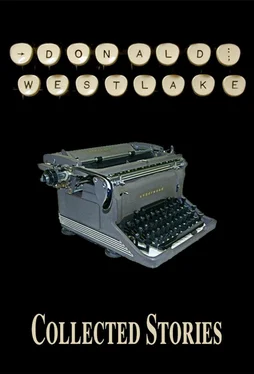Дональд Уэстлейк - Collected Stories
Здесь есть возможность читать онлайн «Дональд Уэстлейк - Collected Stories» весь текст электронной книги совершенно бесплатно (целиком полную версию без сокращений). В некоторых случаях можно слушать аудио, скачать через торрент в формате fb2 и присутствует краткое содержание. Год выпуска: 2020, Издательство: Jerry eBooks, Жанр: Фантастика и фэнтези, Детектив, short_story, на английском языке. Описание произведения, (предисловие) а так же отзывы посетителей доступны на портале библиотеки ЛибКат.
- Название:Collected Stories
- Автор:
- Издательство:Jerry eBooks
- Жанр:
- Год:2020
- ISBN:нет данных
- Рейтинг книги:5 / 5. Голосов: 1
-
Избранное:Добавить в избранное
- Отзывы:
-
Ваша оценка:
- 100
- 1
- 2
- 3
- 4
- 5
Collected Stories: краткое содержание, описание и аннотация
Предлагаем к чтению аннотацию, описание, краткое содержание или предисловие (зависит от того, что написал сам автор книги «Collected Stories»). Если вы не нашли необходимую информацию о книге — напишите в комментариях, мы постараемся отыскать её.
Collected Stories — читать онлайн бесплатно полную книгу (весь текст) целиком
Ниже представлен текст книги, разбитый по страницам. Система сохранения места последней прочитанной страницы, позволяет с удобством читать онлайн бесплатно книгу «Collected Stories», без необходимости каждый раз заново искать на чём Вы остановились. Поставьте закладку, и сможете в любой момент перейти на страницу, на которой закончили чтение.
Интервал:
Закладка:
“Fine,” said Gamble Two, beaming. He also sat; he even leaned back and made himself comfortable. “‘First, as to myself. I am Gamble Two. I am an android. I am from the twenty fifth century. I am a policeman, until recently assigned to customs duty. I have just been promoted, and my job assignment changed to the Time Police. You are, frankly, my first important case.”
Ward looked sour. “I am?”
“Yes.” Gamble Two nodded. “You are Emory Ward. You are a commercial artist. An illustrator. You work primarily for science fiction magazines and paperback book companies.”
“So what?”
Gamble Two waved a hand at the illustrations covering the walls. “This,” he said, “is what you are best known for. Machines. Machines of the future. Space ships, cybernetics machines, robots, weapons, all the manufactured and constructed paraphernalia of future civilizations.”
Ward repeated, “So what?”
“Some illustrators, work mainly with the depiction of strange and fantastic life forms, creatures from other planets. Some work mainly with the human form, usually the female human form. Some are best known for their illustrations of uniforms. The Space Corps, the Intergalactic Patrol, strange uniforms with strange insignia. Some have made their names drawing other worlds, strange, seething jungles, rocky landscapes, tundras. But you draw machines.”
Emory Ward said, “I’d like to be drawing a machine right now. I got a deadline.”
Gamble Two raised a restraining hand. “Please. I hastened to the point. All of these illustrators, teeming and pouring through the newsstands, spreading their imaginations across the covers and interiors of magazines, all are wild and far-fetched and illusory. All except you.”
“Me?”
“You.” Gamble Two stood and viewed at close hand some of the illustrations on the wall. He tapped one. “Here,” he said. “This instrument panel. The J-27 model intra-system four-seater. I have operated the J-27. This instrument panel is correct. To the smallest detail, correct. Even to the alphabet used, the words on the various dials and levers. All correct.” He proceeded to another illustration. “Here,” he said. “This robot. I own one exactly like this. He is my janitor. Everything is perfectly in order. It is almost a photograph.” He proceeded around the room, tapping various illustrations, nodding and saying, “Yes,” and, “Here,” and, “Exactly.”
Ward snorted. “Ridiculous.”
Gamble Two returned to his seat. “You say ridiculous. Next, you will say coincidence. I deny both.” He mused, as Emory Ward squirmed. “Time travel,” said Gamble Two, still musing. “So fascinating, yet so impractical. So unproductive. Man is born, grows to maturity, lives and dies. All within one environment. It is as necessary to him as atmosphere. We know this. A man from the Greece of Pericles, how long could he last in this century? He would not speak the language; he would be terrified by the machines. He could not last.”
“Naturally,” said Ward.
Gamble Two reflected. “A man from this century, in the Greece of Pericles. He might stand a somewhat better chance. He could at least get an academic knowledge of the language. But could he survive?”
“Probably not,” said Ward.
“Definitely not,” agreed Gamble Two. “The change in environment. He would have no resistance to germs. Disease bacteria evolve. He would miss all the conveniences of civilization he had come to accept as a part of the environment. His ideas would be completely out of tune with the time. He would be shunned. He might even be stoned. He would last perhaps a week.”
“One out of every five science fiction stories I illustrate,” said Ward, “is based on just this conclusion. Finish, please, and let me get back to work.”
But Gamble Two could not be hurried. “Could any man survive in an era other than his own?” he wondered. “Could any man usefully employ his knowledge of his original environment?”
“Probably not.”
Gamble Two held up a finger. “One kind of man can survive in environments other than his own,” he suggested. “Think of ship-wrecked sailors on South Sea islands.”
“They usually went mad.”
“Precisely the point,” said Gamble Two. “Before one can integrate himself into a new environment, he must divorce himself from the old. There is only one way to divorce oneself from one’s environment. Insanity. Psychosis.”
“A psychotic divorces himself from all environments,” Ward suggested.
“Exactly. He doesn’t even hear doorbells.”
Emory Ward flushed. “Now, wait a minute; I heard that doorbell. I got a deadline. I never answer the doorbell when I got a deadline.”
“I am almost finished,” Gamble Two assured him. “We have already answered one point. Only a psychotic could make the necessary adjustment to a totally new environment. Now. Is there any man who could survive at the economic level in an environment other than his own? A physicist from this century, for instance, would be an unskilled laborer in Julius Caesar’s Rome. As environment changes, vocations change.”
“What about a doctor?” asked Ward. “A twentieth century doctor in second century Rome.”
Gamble Two shook his head. “Useless. Doctors do not cure, they only prescribe cures. And what good would it do a doctor to prescribe penicillin, aureomycin, or even aspirin, in an environment where such products do not exist?”
“Then,” said Ward, “The answer is no one.”
“There is a possibility, however,” Gamble Two corrected him gently. “What about an artist, an illustrator? All he requires are the drawing tools of the period. Pencil on paper, berry juices on stone, what does it matter to him? He can draw with anything.”
Emory Ward was stunned. “You’re not suggesting.”
“It is a severe crime,” Gamble Two told him, “to attempt to escape one’s obligations by running away through time. You are well aware of that.”
Ward shook his head. “You’re out of your mind.”
Gamble Two ignored him. “Return with me to the South Seas,” he said. “The shipwrecked sailor again. He always retains his European clothing, although the native dress, or undress, is much more suitable for the environment. Why is that?”
“You’re making a terrible mistake,” Ward said urgently.
“It is not possible,” Gamble Two said sadly, “for man to divorce himself entirely from his native environment. The sailor keeps his European clothes. You wistfully draw pictures of the machines you once knew and loved, the machines that once seemed so necessary to civilized life, and which you now must try to get along without. Gamble Two pointed an accusing finger. “You are from the twenty fifth century.”
Defiantly Emory Ward stated, “I am not.”
Gamble Two sighed. “I wish you would just admit it and be done with this foolishness. They should have sent an esper. I wish I could read your mind. The only thing for me to do now is return you for identification: You are from the twenty fifth century, aren’t you?”
“I am not.” Emory Ward erected a force field around himself, then he put Gamble Two in a temporary state of paralysis. Very flamboyant. Finally, he withdrew from a desk drawer a hand weapon precisely like one in an illustration on the wall. Very functional. “I am from the thirtieth century,” he said.
Journey to Death
Although ocean voyages are not new to me, I have never grown accustomed to the sway and roll of ships, especially at night. For that reason, I normally get very little sleep while crossing the Atlantic, not being able to close my eyes until I have reached such a point of exhaustion that it is no longer possible for me to keep them open. Since business often makes it necessary for me to journey to America, my wife has urged me, from time to time, to go by air, but I’m afraid I’m much too cowardly for that. The rolling of a ship at sea causes uneasiness in both my stomach and mind, but the mere of traveling through the air terrifies me. A sea voyage, then, is the lesser of two evils, and I face my insomnia, after all these years, with the calm of old resignation.
Читать дальшеИнтервал:
Закладка:
Похожие книги на «Collected Stories»
Представляем Вашему вниманию похожие книги на «Collected Stories» списком для выбора. Мы отобрали схожую по названию и смыслу литературу в надежде предоставить читателям больше вариантов отыскать новые, интересные, ещё непрочитанные произведения.
Обсуждение, отзывы о книге «Collected Stories» и просто собственные мнения читателей. Оставьте ваши комментарии, напишите, что Вы думаете о произведении, его смысле или главных героях. Укажите что конкретно понравилось, а что нет, и почему Вы так считаете.








